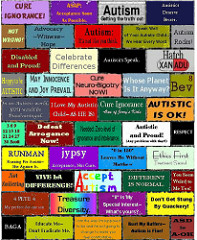The Kid recently took the ACT test, which like the SAT, is frequently used by colleges to determine scholastic abilities, and in his case helped place him for which college writing class he needed. He had to ask his sister what the test was like, and her impressions about its difficulty level. I could not personally provide any opinions, because I had never taken the ACT or SAT.
I never took them because no one thought I would go to college.
They made massive assumptions about my abilities and my future. So here’s what happened, and something to think about. I welcome you to please post comments, and more links to other positive blogs and sites.
My grades in secondary school grew worse over the years, and I had to re-take a semester in one class (English of all things, which in later years proved to be ironic when I became a freelance writer, with hundreds of items in print).
By this time in my life, my parents had divorced. My dad lived in another state, and was even more of a non-player in my life. Alas, my mother had spent years futilely trying to make me more “normal”, from requiring me to learn right-handed penmanship, enrolling me in a “charm school” at the local Sears & Roebucks to improve my feminine graces, and so on. But as the years wore on, my faults (problems) became more and more apparent. She no longer described me as “very bright”, but was quick to list all my failures and describe them in damning detail, until I was ready to vomit or pass out from the stress (though I never did, even though either would have been a relief).
By 9th grade it was apparent to all that I was not gifted scholastically, and the general consensus was that I was lazy, stupid at math, not trying hard enough, and acting up just to make her life difficult. When she was drunk, my failures and interests and personality traits would be compared to her ex-husband’s, “you’re just like your father, the bastard”. Even as much of a socially-clueless 14 year old that I was, I knew that these kinds of comments were untrue and inappropriate, and the problem was with her attitudes and her drinking. But they still hurt, terribly.
I would not be diagnosed with ADHD, Auditory Processing Disorder, and Prosopagnosia until I was in my 40’s. Such diagnosis hardly existed in those days; certainly my difficulties were not considered to be due to anything but my own personal failings.
No way, my family and school officials decided, could I be college material. I could not keep track of my assignments, I still struggled to learn and remember my multiplication facts into 8th grade, and I flunked or barely passed classes.
Given my social difficulties and subsequent lack of dating, and even my utter lack of domestic abilities (mom warned me off taking a sewing class because doing so would “ruin my GPA” – grade point average), I was obviously not highly marriageable. This was the 1970s, and most people still thought along those lines — an astonishing number of girls went to college to “get their MRS”.
The goal then was to get me some kind of minimal trade training, so I would, as she fiercely reminded me many times, not be a burden on the family. It was made plain to me that once I graduated high school, and then later turned 18, I was to be out on my own. I should not expect financial assistance from her.
So I was enrolled in typing, which was a miserable experience beyond the whole ordinary ordeal of learning to type on manual typewriters. The room was a cacophony of noise. The instructor was adamant about constant attention to task, proper posture, and graded with the intent on us producing perfection — as soon as a student produced a typographical error, then the score was made. (Additionally, the students’ pages were held up to the light against her perfect copies to check centering and spacing). There were many days when I would produce an entire page that was otherwise perfect but for a typo in the second line, and my grade would be an F because I had such a low word-count. Given my problems with developing manual speed, tracking text (near-point copying), attention, and transposing letters and numbers, I struggled to get a C grade.
But the clerical work that was deemed best for me also required taking bookkeeping. Not surprisingly, this was also a very difficult class for me. My aptitudes and interests were not really taken into consideration, because after all, even if writing and science and art were what I liked best, I had not done well in those classes, now had I? Besides, clerical work was what my mother knew, so like many parents she expected me to follow occupational suit.
Unlike many such students, my story has a relatively happy ending. I did manage to graduate high school, to everyone’s relief. A year later, I even enrolled in an evening class at the local community college. College classes were not easy, partly from my intrinsic difficulties, partly from not having the necessary study skills, and partly from not having a solid academic background.
But the glory of the American system is that such colleges provide opportunities for adults of all ages to acquire the these things, and to gain higher education. I worked hard, and slowly figuring out how I learned, which was not always in the ways that others thought I should study. Sometimes I had to drop a class and re-try it later on, to finish it successfully. Later on in my 40’s I was to also get some of my issues diagnosed.
I now have a Master’s of Science. I teach college students. No one would have expected this based upon my previous performance. (Employers who place near-complete trust in Behavioral-Based Interviewing, please note!) And this point, amongst all the others about the perils of attribution errors, and learning disabilities, and dysfunctional families, this point is crucial:
A child’s future abilities cannot always be predicted,
when based upon their current abilities.
Many parents of children who have developmental disorders worry that their children will never be able to attend school, or finish school, or go on to college, or hold a job, or live on their own, or be loved by a partner, or have a family, or talk, or be potty-trained, or any number of milestones. Just because the child cannot do the same things that their age peers can do, or are expected to do.
This is one of the biggest points of contention or discussion between the “autism community” (parents of autistic children) and the “autistic community” (children, teens and adults who are autistic, and many of whom are parents as well). Even beyond the farcical assumptions that either community is monolithic with regards to attitudes and knowledge and politics et cetera, there are inherent issues that need to be mutually addressed.
One of the best resources for the autism communities are the autistic communities. If parents go around just talking to other parents, especially those other parents who are consumed by the “Terrible Tragedy and Selfless Suffering Families” world-views, they may fall prey to this easy assumption: If my child can’t do it now, he’ll never be able to do it, and our lives will be ruined.
Sure, not everyone takes it to that extreme. Sure, there are a few children who do not achieve many of those life-goals. But those lack of achievements does NOT automatically mean that their lives are ruined, or their families’ lives are ruined. They do NOT automatically mean that people cannot live relatively happy, healthy, and productive lives.
Please do NOT assume that not being able to use speech as a reliable means of communication is the same as not being able to think, or not being able to communicate, or not having anything to communicate.
Please do not assume that because a child does not learn in a traditional manner that they are learning “the wrong way”, or that they cannot learn at all, or that they must be taught “remedial learning lessons”.
Please do know that even when children have problems, and are slower to acquire skills, they are not doomed.
Please do not give up on them.
“Don’t talk to me like I’m an idiot.”
~First words (at age 35) of an autistic man [quote source]
I welcome you to please post comments, and more links to other positive blogs and sites. Kindly see the newly-updated “NOTES TO COMMENTERS” box in the top of the left sidebar for important information. Read the rest of this entry »











You must be logged in to post a comment.